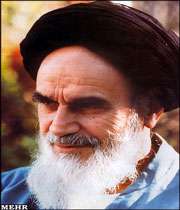صلی الله علیک با ابا عبد الله
یا صاحب الزمان یا شریک القرآن والامام انس والجانصلی الله علیک با ابا عبد الله
یا صاحب الزمان یا شریک القرآن والامام انس والجانHazrat Fatimah (s.a
Hazrat Fatimah (s.a), the Link between Prophet Hood and Imamate (Part 1)
Fatimah (s.a) was the only woman connecting Prophet Hood and Imamate and was the link between the two. She was the daughter of the Holy Prophet (PBUH), the wife of the first Imam (a.s) and the mother of the rest of the Imams (s.a) who descended from her and her husband Ali (a.s). Allah singled her out with this virtue and peculiarity because she was the most perfect and highest example in purity, sanctity, worship, asceticism and morals.
Al-Kausar
According to some Qur'an commentaries (tafsir), when the Quraysh (tribe) said that the Prophet (PBUH) had no offspring, the chapter of al-Kausar was revealed:
'Verily We have given thee the Kausar (Abundance). Therefore pray to your Lord and make a sacrifice. Surely your enemy is the one who shall be without posterity. The Holy Quran (Surah 108, A river in paradise, verses 1to 3)'We have given you al- Kausar, means we have given you the abundant good, which shall last throughout your life and after it; therefore, turn your face unto your Lord in prayer, as mention of your name shall never end and your offspring shall never perish; it is those standing against you who are more deserving of this description.
This revelation was given against the backdrop of the pronouncements by some of the Quraysh's most scurrilous men - such as al-'As bin Wa'il, Abu Jahl, 'Uqbah bin Abi Mu'ayt and Ka'b bin al-Ashraf - that the Prophet (PBUH) was cut off from male children, after the death of his son al-Qasim. Hence, it is clear that the abundant good - al-Kawthar - was pointing to the abundant offspring which the Prophet (PBUH) would have through his daughter Fatimah (s.a), and that this was a reply to those people and their effort to weaken the Prophet's spirits.
Supporting our interpretation, al-Tabataba'i, in al-Mizan commentary, said: 'Without that, the words 'Verily, thy enemy shall be the one cut off' would be useless.'
Her Childhood
In Fatimah's childhood, there was no place for playing, leisure and purposelessness. Nor were her energies those of a child living a childhood of innocence and simplicity. Rather, hers was the energy of a child who stored within herself a feeling for the role which she should play in the Messenger's life and the suffering and pain which he was facing. It was a childhood with the characteristics of motherhood, living its spirit and fulfilling its role.
There she was, and having opened her eyes to life, she saw her father (PBUH) coming every now and then, weighed down by the pressures, burdens and harm inflicted by the atheists; so she would embrace her father and relieve his pain and take care of him with all kindness.
One day, she saw her father (PBUH) in the Holy Mosque of Mecca after the atheists had dumped dirt and rubbish over his back while he was praying to his Lord. She promptly went forward and removed the rubbish with her small hands, expressing her sadness and condolences to him (PBUH) with her tears.
This is what made her open up to her responsibilities in her early childhood to stand by her father, to take care of him and empathize with him; and he was the one who had lost his mother, and his sympathetic wife. She stood by him when he was challenged with the Message: some called him names, others accused him of being insane, others threw dirt and stones on him; his uncle Abu Lahab crying out: 'No doubt, Muhammad (PBUH) has bewitched you!'
But when he returned home, he would be greeted by Fatimah (s.a), with her sympathy and care, which was not that of a child weeping without awareness..... She was sensing that his pain was also hers and so amassed during her childhood the pain of the Message and pain of the Messenger... And whosoever amasses in their early childhood the awareness of the pain of the Messenger and the Message cannot find time for leisure or playing or purposelessness; playing and purposelessness occur in our lives because of an emptiness, which we are trying to fill.
This was how Fatimah (s.a) grew up, not like other children, but as a person with mission in her feelings, emotions, opinions and her whole dynamic attitude.
مبارزی مهربان در خانواده
مبارزی مهربان در خانواده

در مورد صفا و صمیمیت و عطوفت و مهربانی امام نسبت به خانواده و همسر و دختران خودشان شاید بتوانم ادّعا کنم که کسی را در آن حد ندیدهام. امام هیچگاه وقتی خانم در منزل بود، تنها غذا نمیخوردند. یعنی اگر سفره را پهن میکردند و غذا در سفره آماده بود و خانم از اتاق بیرون رفته بودند، امام دست به غذا نمیزدند تا خانم تشریف بیاورند و بنشینند و با یکدیگر غذا بخوردند.
با شکلگیری پیوند ازدواج، دو فرد مجرّد در کنار همدیگر قرار میگیرند تا برای آرامش و آسایش یکدیگر تلاش کنند و در همه امور با هم باشند ، با هم تصمیم بگیرند ، مدیریت ، صحبت و درد دل کنند ، در تربیت فرزند شریک شوند ، مخارج زندگی را تامین نمایند و از همه مهمتر ، در کنار هم باشند. ولی اگر ازدواج شکل بگیرد و زن در پی امورات خویش باشد و مرد هم از صبح تا شب در پی کار خود باشد و زن و مرد نتوانند از وجود همدیگر استفاده کنند، دیگر فلسفهی وجودی ازدواج از بین میرود، یا اگر زن همیشه از صبح تا شب تنها در خانه منتظر شوهرش باشد، ولی شوهر به او هیچ توجّهی نداشته و او نیز برای خودش تنها باشد، این زندگی آسیبپذیر است و هنوز به آن سطوح اصلی خود نرسیده است. اصولاً خوش اخلاقی، اظهار محبّت و دوستی، پرهیز از تحقیر و توهین، تلاش در راه تامین مخارج زندگی، نظافت، آراستگی، حفظ عفّت و پاکدامنی و از همه مهمتر، اختصاص وقت و در کنار همسر بودن از وظایف مرد نسبت به زن میباشد.
شوهر خوب و لایق، با زبان و رفتارش زیباترین کلامها را نثار همسرش میکند؛ همانگونه که پیامبر اکرم صلیالله علیه واله وسلم میفرمایند:
شایستهترین مرد از نظر ایمان، خوش اخلاقترین آنان و مهربانترین آنها با خانوادهاش است و من مهربانترین شما با خانوادهام هستم.

پس، از رفتارهای بزرگان دین به این نتیجه میرسیم که مرد باید در کنار همسرش باشد و تا میتواند نگذارد او تنها باشد. این رفتار تاثیر بسیار مهمی در تربیت کودک دارد ، وقتی کودک به محبّت پدر و مادر پی میبرد، دچار کمبود عاطفی نمیشود و از همه مهمتر، نقش پدر و مادر را در کنار همدیگر احساس میکند.
یک بار از امام پرسیدم: شما چرا این قدر به خانم علاقه دارید؟ گفتند: « برای اینکه خیلی وفادار بوده، خیلی فداکار بوده، زجری که خانم کشیده هیچ کس نکشیده.» همیشه به خانم میگفتند: «از من راضی باش، من خیلی در حقّت بدی کردهام.»
انتظار مرد از خانمش باید مثل انتظار مردم از شاخه گل باشد. گل لطیف و ظریف و خوشبوست؛ پس زن نباید کارهای مشکل را انجام دهد. کسی شاخهی گل را با دست خود افسرده و پژمرده نمیکند. اگر زن فداکاری میکند، باید رضایت او را بهطور کامل جلب کرد. حضرت علی علیهالسلام میفرمایند:
در هر حال با همسرت مدارا کن و با او با نیکی معاشرت نما تا زندگیات باصفا شود.
اگر در زندگی میبینید یک خانم با همه وجودش زحمت میکشد و صبور است، بردباری میکند، فکر نکنید وظیفه اوست او زحمت میکشد و به شما علاقه دارد. در حقیقت او فداکاری میکند. اگر میخواهید این رفتار در او تقویت شود، حتماً به زحماتش پاسخ دهید و برای خودش و کارهایی که میکند ارزش قایل شوید.
منبع : کتاب خانواده و امام خمینی - نویسنده : میرزابیگی





